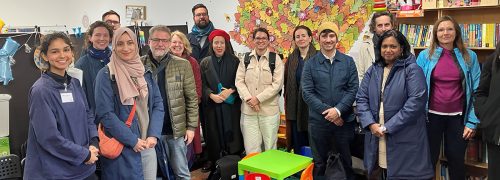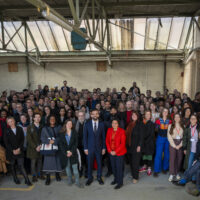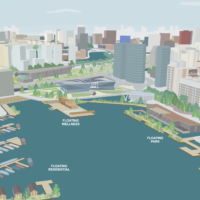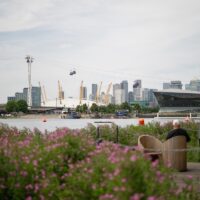
Regeneration news
Creating social value at the Royal Docks in Newham
The Royal Docks is the Mayor of London’s largest land-led project and the regeneration team is focused on “place stewardship”. Future of London visited to find out what it means to create a social value legacy.
Article by Hailey Sockalingam, originally published at Future of London on 21st November 2023
The Royal Docks is London’s only enterprise zone and a joint initiative by the Mayor of London and LB Newham. They plan to create 40,000 jobs and 30,000 new homes across eight developments.
During our field trip, we heard from organisations of different scales, from anchor institutions to community representatives about establishing social value for the long term. These included a real estate company, Lendlease, international exhibition centre ExCeL, the West Silvertown Foundation charity and two ‘citizen scientists’.
Reflecting on social value legacy was useful for all partners. A legacy framing brings new direction to social value initiatives and clarifies the steps that can be taken now to set up place stewardship in twenty years.
- For Lendlease, taking a legacy lens means thinking about what support they can put in place early on, to help residents become stewards of place once a development is complete.
- The Citizen Scientist project shows that community engagement with a legacy objective will develop residents’ skills and improve their future employability. Strong entrepreneurial skills can help community organisations create sustainable business models with funding they receive.
- West Silvertown Foundation’s story shows that social value can snowball over time, in a positive or negative way. Being a good ancestor means creating social value that others can build on in the future.
- ExCeL London’s legacy objective is to create meaningful connections between organisers of events and the local community.
Sharing knowledge is an essential first step
The Royal Docks team is overseeing the development of this publicly owned land and aspire to use their influence to leverage a social value legacy in the public interest.
Sarah Atkinson, Community and Stakeholder Relations Manager, explained:
“In the Royal Docks we have aspirations around ‘place stewardship’. This means working to support different stakeholders to collaborate around a joint ambition to make social impact an outcome of the area changing.”
“We want social value to go beyond individual planning and reporting, towards long-term joint strategies that are mutually supportive and share goals around what equitable regeneration means here.”
Their aspiration for regeneration for good is anchored in the Greater London Authority’s Good Growth Strategy and LB Newham’s Community Wealth Building plan.
The team hopes to set up local stakeholders to communicate and share knowledge in ways they otherwise might not have. From a legacy perspective, Sarah says community input often emphasises the local significance of the water and industrial heritage. The Royal Docks Team has responded by making these central themes in their programmes on public realm, culture and economy.
Collective accountability needs to grow throughout a development
Lendlease is a globally integrated real estate company and will stay on site for the next twenty years to build new homes. Zen Mumtaz, Socio-Economic Development Manager at Lendlease, explained how they aim to develop stewardship models.
“For us, becoming a good ancestor means not only generating added value during the construction phase, but also understanding and working toward implementing long-term models of stewardship that take effect once the development is operational.”
“Building capacity within the community to empower and allow for collective ownership and accountability is a huge part of the long-term vision for Silvertown.”
Here are some of their mechanisms for delivery:
- Lendlease can help build capacity with local businesses now so they can hopefully take up space once the development is complete. Empowering local business will help create a mixed, affordable retail offering, contributing to a place that feels like it’s for everyone and not just the few.
- Providing free training for residents would support locals to get well-paid jobs on the completed project, and even work in local policy. Lendlease targets that 40% of jobs to be taken by Newham locals.
- The site will also restore the Millennium Mills flour mill dating from 1906, to celebrate the area’s industrial heritage.
From a private sector perspective, Lendlease believe social value for the long-term means evolving with the market as stakeholders broker what social value means.
Committing to do better is an important short-term step. Lendlease is a pledge partner for Newham’s Community Wealth Building strategy and have set an ambitious target of generating £130 billion of social value by 2030.
Being a good ancestor means setting up for others to build next
West Silvertown Foundation is a resident-led organisation set up in the 1990s to serve the local community. Its work included running programmes for young people, children and families and in English language literacy.
When asked about legacy, Chief Executive Helen Fernandes told the story of the charity’s evolution. She explained how its trajectory shows that social value has ripple effects over time and initiatives must be mindful of the long term.
“When it comes to being a good ancestor, we’ve seen the reality in our story. Things can snowball – either positively or negatively. Creating a social value legacy means thinking about what you can do where you are to create something that other people might want to – and be able to – build upon at a later point.”
Tackling crime and creating a new school in West Silvertown
Helen shared cases of ‘negative spiralling’, when a lack of social resource prompted further drain from the area. Similarly, she observed that the key to ‘positive spiralling’ has been creating social impact that others can build on.
For instance, there was previously no local nursery in West Silvertown, so parents who worked in the City of London took their children to day care near Canary Wharf. Once children were settled and had friends there, Helen said it made sense for them to go to school in the City of London, weakening their links with the local community.
West Silvertown Foundation supported a nursery to set up in their community centre, prompting a marked increase in kids staying in the area and enrolling in the local school.
Learning from the Britannia Village development in the 1990s
In another example, Helen shared that when Britannia Village was built in the 1990s, class inequality was embedded into place. Closes with private housing were named after royalty or British greats, while streets with social housing were named after Labour councillors.
The architecture inadvertently facilitated crime, she says, with many blind corners, poor lighting and few houses overlooking the road. Many young men were seeing affluent lifestyles they couldn’t take part in, and in 2010 violent crime in Newham was three times the national average.
West Silvertown Foundation started a summer school that employed young men and women to run activities for younger children. During its first summer, the local crime rate fell to a quarter of what it had been.
Helen warned there could be parts of the charity’s history that even she doesn’t know. When it comes to acting as a mindful ancestor and creating social impact that others can build on, collective memory is a vital resource.
ExCeL targets outreach to create social value at the Royal Docks
ExCeL London is the largest international exhibition and convention centre in the city. Attracting mobile congresses and business events to London means competing with other European destinations and ensuring that London has a compelling destination proposition for organisers, exhibitions and visitors.
Part of ExCeL’s social impact is brokered through those organisers to coincide with their event. ExCeL is creating a toolkit to help event organisers to engage with the local community in a meaningful way.
Engagement can range from donations of food or left-over materials, to more complex projects such as activities with schools and local community groups. Industry associations are particularly eager to use their congresses to draw attention to issues related to their field of expertise. This could be showcasing career paths or, in the case of medical congresses, highlighting the importance of disease prevention.
“Our objective is to instigate meaningful connections between the ecosystems of events hosted at the venue and the local community for mutually beneficial outcomes,” says Claire.
Here are ExCeL’s immediate steps for delivering long-term legacy:
- Creating a robust stakeholder map and needs analysis.
- Integrating social value as part of its business processes.
Legacy engagement equips residents with skills that boost social mobility
The UCL Citizen Science Academy trains residents to do paid research within their communities around measuring prosperity. The programme shows how a legacy approach to community engagement equips residents with research and presentation skills, improving their long-term employability.
We were welcomed into the Custom House community bookshop to hear from citizen scientists Terry Regan and Twinkle Jayakumar who work in the area.
Connecting communities with the UCL Citizen Science Academy
The Royal Docks and Lendlease are sponsoring part of UCL’s study into prosperity in East London which is being designed and implemented with Citizen Scientists. This ten-year longitudinal study examines the barriers to prosperity experienced by over 4,000 households in East London.
- Starting in 2021, ten residents have received three months of ‘citizen science’ training. They have been equipped with the skills needed to carry out research and get involved in social action and local decision making. The competencies they gain in research methods, ethics and fieldwork strategies are recognised by the UCL Citizen Science Certificate.
- Training is delivered in community-based settings.
Twinkle Jayakumar explains:
“We’re keeping the community connected to the people who can actually make a difference. Communities have been neglected for so long, and this is a chance for us to connect the two dots. We are not someone who can tell you, ‘this is your solution’. We can just tell you: ‘this is something that we found out from the locals, is there any way you can help out’.”
“With the skills that we gained from the Citizen Science training, we can apply to do community research for different projects in the future. So far, I’ve worked with Lendlease, Royal Docks and Newham Council. I’d like to see is how the data gathered from the Citizen Science prosperity research will be used in the long term.”
Both Terry and Twinkle voice the frustration many locals feel because regeneration has been promised for almost twenty years.
They say that for some young people, Custom House has been a place-in-waiting all their lives. This shapes their ambitions and they start to feel they can’t expect to live in a polished place with a community at peace.
Entrepreneurial skills are untapped potential for long-term social value
Based on insights gathered from their research, Terry and Twinkle have applied for funding to run a project to support parents of autistic children.
They are one of many community teams who have pitched to People Powered Places, Newham Council’s participatory budgeting initiative that allocates Community Infrastructure Levy (CIL) funds to support community projects. The Royal Docks team is boosting the fund locally and grant winners will be decided by public vote.
Looking forward, Sarah Atkinson points out that community members can be supported to develop entrepreneurial skills. This will help community initiatives channel funding into sustainable business plans and improve their financial security.
Conclusions
These case studies show that taking a legacy approach to social value is a useful exercise for public, private and charity sector organisations.
Thinking about social value legacy helps bring clarity to the short-term steps that contribute to long-term impact. It prompts organisations to reflect on how their social value initiatives can become more interconnected, self-sustaining and create social value that others will be able to build on in the future.


